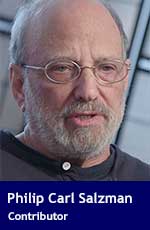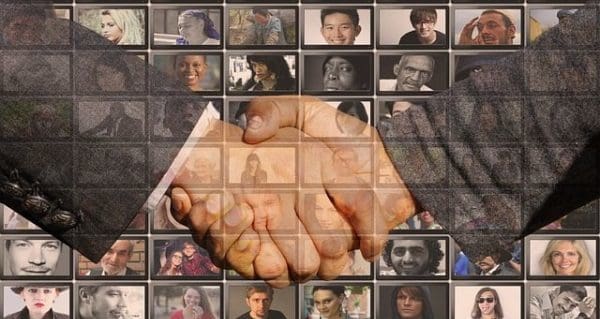 North American political polarization is on the rise. Those on the left appear to move ever further to the left, while those on the right find less and less in common with fellow citizens. The political rhetoric has escalated to a toxic level.
North American political polarization is on the rise. Those on the left appear to move ever further to the left, while those on the right find less and less in common with fellow citizens. The political rhetoric has escalated to a toxic level.
Half of Americans are labelled sexist, racist, homophobic and Islamophobic; a basket of deplorables, redneck failures who cling to their guns, fundamentalist religion, and fear; and white supremacists.
Those of the American progressive left are viewed as traitors of America, betrayers of western civilization, haters of Christianity and apologists for Islam, violators of the Constitution, advocates of open borders who wish to bring a flood of Third World immigrants (even those dedicated to destroying the West), enemies of capitalism who openly revere socialism, and champions of a dominant state apparatus that aims at suppressing freedom.
Canada is increasingly polarized along the same lines, with Parliament denouncing the non-existent psychiatric condition Islamophobia in order to suppress criticism of Islam and the press driving out conservatives such as Kellie Leitch. At the highest political level, Canada’s heritage in western civilization is denied in favour of ‘diversity,’ and minorities favoured over majorities.
Canadian government programs exclude religious organizations that don’t subscribe to progressive ideology. Radical feminists who demand that all female allegations of male misbehaviour be believed without the support of evidence can count on the highest echelons of Canadian politics to support them.
While this polarization suggests that choices must be either extreme progressive or extreme conservative, in fact there are a wide range of positions between the extremes. One of them is classical liberalism.
Of course, Canadians are familiar with the terms and relate them to the names of the two main Canadian political parties, the Liberals and Conservatives. What these parties mean by their labels is not always obvious.
In the U.S., the Democrats are often thought to be liberal and the Republicans conservative, but again, what these terms mean in political party terms is ambiguous at best and usually covers a wide range of views, some incompatible with one another.
What we can say is that under each label, ‘liberal’ and ‘conservative,’ a variety of orientations are recognized.
There are fiscal conservatives, who wish to restrict government spending; social conservatives, who wish to retain established rules of behaviour; religious conservatives, who have a strong commitment to a traditional religion; and foreign policy conservatives, who wish to limit foreign entanglements or, alternatively, to pursue foreign influence more energetically. Fiscal conservatives may not be social conservatives, social conservatives may not be religious, and advocates of a muscular foreign policy may not be fiscal conservatives, while social conservatives may not be any of the others.
Liberalism has come to be used for a wide spectrum of leftist opinion, from moderates of the centre, to government interventionists, to wealth redistributionists, to democratic socialists, perhaps stopping short of communists. So the meaning of ‘liberal,’ in terms of specific ideas, policies and programs, is very unclear.
I’d suggest that the broad spectrum of opinion now labelled ‘liberal’ be broken into two narrower ranges, one more centralist to be labelled ‘liberal,’ and the other more leftist, to be labelled ‘progressive.’
Britannica defines liberalism as a “political doctrine that takes protecting and enhancing the freedom of the individual to be the central problem of politics. Liberals typically believe that government is necessary to protect individuals from being harmed by others, but they also recognize that government itself can pose a threat to liberty.”
Philosophy Basics says there are two major currents of thought within liberalism:
Classical liberalism holds that the only real freedom is freedom from coercion, and that state intervention in the economy is a coercive power that restricts the economic freedom of individuals, and so should be avoided as far as possible.
Social liberalism argues that governments must take an active role in promoting the freedom of citizens, and that real freedom can only exist when citizens are healthy, educated and free from dire poverty.
Is social liberalism, which can embrace everything from the welfare state and democratic socialism, distinguishable from progressivism? According to the Center for American Progress, “progressivism as a reform tradition has always focused its moral energy against societal injustice, corruption, and inequality.”
Progressivism, too, has different streams, the main two described by Nate Silver at the website fivethirtyeight:
Rational progressivism believes that with the use of reason and the exchange of ideas, society will tend to improve itself through scientific and technological innovation. Rational progressivism tends to be trusting, within reason, of status quo political and economic institutions – generally including capitalism. However, unlike conservatism, it also sees these institutions as works in progress. The project of rational progressivism, then, is to propagate good ideas and convert them, through a wide and aggressive array of democratic means, into public policy.
Radical progressivism represents a much more radical and comprehensive critique of the status quo, which it tends to see as intrinsically corrupt. Its philosophical tradition originated in 19th century thought and owes a great deal to the Marxist critique of capitalism and the Marxist theory of social change as “transformation.”
Classical liberalism advocates in favour of individual liberty, limited government, voluntary contracts and the market economy, free speech, equality before the law, and democracy.
Social liberalism and progressivism advocate in favour of strong government intervention, equality of result, obligatory redistribution of wealth, restrictions on speech, and treating people according to their racial, religious, gender, ethnic and sexual identity categories.
Radical progressivism dispenses with democracy in favour of one-party states.
Liberals and progressives are at odds over several important issues:
- Progressives are obsessed with equality of result, and wish to redistribute wealth so everyone has the same. Liberals believe in the marketplace, the security of property and the right of those who earn wealth to keep it.
- Progressives demand equality in university admissions, hiring and political posts, and representation according to population. Liberals are in favour of individual merit, and oppose giving people special privileges or benefits according to census categories; they thus oppose reverse sexism, reverse racism and all such programs.
- Progressives insist that speech that they don’t like be banned, calling it hate speech. Anyone disagreeing with them are likely to be accused of being racist, fascist and the like. Liberals are in favour of individual freedom, particularly freedom of speech.
- Liberals favour rule of law and thus don’t support allowing lawbreakers to have free rein, as progressives advocate, for example in their active support of illegal immigrants in universities and sanctuary cities. Progressives call for open borders. They condemn whites as oppressors. Liberals prefer to think of people as unique individuals rather than reducing individuals to general categories.
Liberals tend to think that human nature is given and mixed. They think that social arrangements need to be open, such as in market economies, to allow individuals to seek their own destinies.
Progressives, especially radical progressives, think human nature is perfectible. They think that perfecting social institutions would lead to individual perfection.
Conservatives tend to believe that human nature is flawed and that evil flows from those flaws. Therefore, they expect social reform will always disappoint because, due to human nature, there will always be crime, poverty, corruption, social hierarchy and war. They look to religion, family and heritage to fend off the worst aspects of human nature.
It’s time for those with more moderate views to take a stand against the increasing extremism we see today.
Philip Carl Salzman is professor of anthropology at McGill University, senior fellow at the Frontier Centre for Public Policy, and fellow of the Middle East Forum.
The views, opinions and positions expressed by columnists and contributors are the author’s alone. They do not inherently or expressly reflect the views, opinions and/or positions of our publication.


